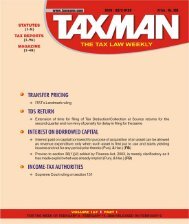news round up - Taxmann
news round up - Taxmann
news round up - Taxmann
- TAGS
- news
- round
- taxmann
- taxmann.com
Create successful ePaper yourself
Turn your PDF publications into a flip-book with our unique Google optimized e-Paper software.
118 GOODS & SERVICES TAX - MAGAZINE [Vol. 1<br />
any GST paid on goods and services s<strong>up</strong>plied to him for the purpose of his<br />
business. The ‘sale and lease of residential properties and financial services’<br />
are exempt from GST in Singapore.<br />
In short, in Singapore, GST is a tax on domestic consumption. The tax is<br />
paid when money is spent on goods or services, including imports. It is<br />
multi-stage tax which is collected at every stage of the production and<br />
distribution claim.<br />
2.5 HONG KONG GST - GST is also known as value added taxes (VAT) and<br />
sometimes sales taxes. GST and VAT are the same tax under different<br />
banners. They are taxes charged on the consumption (or spending) and<br />
not on income earned. Because of their underlying natures, they ultimately<br />
impact only on private consumption. Businesses are entitled to a<br />
refund (usually by way of a credit against GST collected on sales) for any<br />
GST paid in respect of goods and services consumed by the business.<br />
The two principal features of a broadly-based GST are that the tax applies<br />
to virtually all domestic consumption of goods and services and that it is<br />
a tax paid by the final consumer. GST is collected at each stage of the chain<br />
of production and distribution. Each party accounts for the tax on the<br />
value that has been added to the goods and services. Every party charges<br />
GST on its outputs (output tax), but can claim credits for all tax paid on the<br />
goods and services when received (input tax). Although intermediate<br />
purchasers of goods and services pay GST, because of the credit-offset<br />
mechanism, the final and total burden of the GST is paid for only by the<br />
final consumer. There is no cascading of the tax. GST is based on the<br />
concept of ‘taxable s<strong>up</strong>plies’. Every person making taxable s<strong>up</strong>plies exceeding<br />
a legislatively specified sum or engaged in certain business must<br />
be registered for GST. For those s<strong>up</strong>pliers whose taxable s<strong>up</strong>plies do not<br />
exceed the registration threshold, registration is not mandatory but GST<br />
input credits can only be claimed if a business is registered. Many<br />
jurisdictions allow a system of voluntary registrations for businesses<br />
below the statutory thresholds.<br />
Where goods or services are exempt from GST, no tax is charged by the<br />
vendor on the consumption but the vendor cannot claim credits for GST<br />
paid at the input stage. Internationally, the treatment of financial services,<br />
e.g., normal bank dealings that are not zero-rated, is not yet settled. In<br />
many cases, financial services are exempted from GST because of competition<br />
in the international market place. The GST is levied at a flat rate<br />
of 5 per cent. The Government undertakes to decrease or eliminate other<br />
taxes to make it revenue neutral.<br />
GST in Hong Kong is a self-assessment tax.<br />
Key aspects of Hong Kong’s GST could be summarized thus :—<br />
� Export of goods, international s<strong>up</strong>plies, and financial s<strong>up</strong>plies would<br />
not be subject to GST;<br />
� Residential property sales and rentals would not be subject to GST;<br />
GOODS & SERVICES TAX CASES ❑ JANUARY 20 - FEBRUARY 4, 2010 ◆ 28











![“FORM NO. 3CEB [See rule 10E] Report from an ... - Taxmann](https://img.yumpu.com/45480232/1/190x245/form-no-3ceb-see-rule-10e-report-from-an-taxmann.jpg?quality=85)





